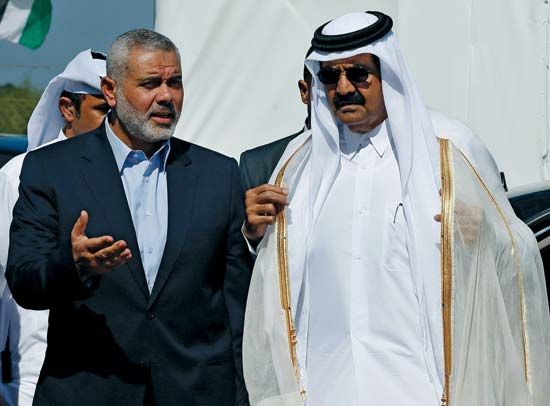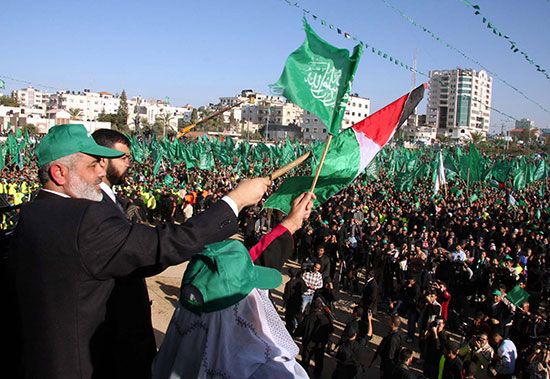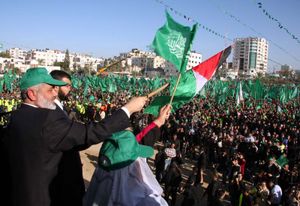Ismail Haniyeh
- Also spelled:
- Ismail Haniya and Ismāʿīl Haniyyah
- Pronounced:
- is-mah-EEL ha-NEE-yah
- Born:
- 1962?, Al-Shāṭiʾ refugee camp, Gaza Strip
- Political Affiliation:
- Hamas
News •
Ismail Haniyeh (born 1962?, Al-Shāṭiʾ refugee camp, Gaza Strip—died July 31, 2024, Tehrān, Iran) was a Palestinian politician and Hamas leader who served as prime minister of the Palestinian Authority (PA) in 2006–07, after Hamas won a majority of seats in the 2006 Palestinian legislative elections. After interfactional fighting with rival Fatah led to the dissolution of the government and the establishment of an autonomous Hamas-led administration in the Gaza Strip, Haniyeh served as the leader of the de facto government in the Gaza Strip (2007–14). In 2017 he was selected to replace Khaled Meshaal as Hamas’s political bureau chief.
Early life and political activity
The son of Palestinian Arab parents displaced from their village near Ashqelon (in what is now Israel) in 1948, Haniyeh spent his early life in the Gaza Strip’s Al-Shāṭiʾ refugee camp, where he was born. As was typical for refugee children, Haniyeh was educated in schools run by the United Nations Relief and Works Agency for Palestine Refugees in the Near East (UNRWA), which also provided food aid and medicine for the inhabitants of the camp. In 1981 Haniyeh enrolled in the Islamic University of Gaza, where he studied Arabic literature. He was also active in student politics, leading an Islamist student association affiliated with the Muslim Brotherhood.
When the Islamist group Hamas formed in 1988, Haniyeh was among its younger founding members, having developed close ties with the group’s spiritual leader, Sheikh Ahmed Yassin. Haniyeh was arrested by Israeli authorities in 1988 and imprisoned for six months for his participation in the first intifada (uprising against Israeli occupation). He was arrested again in 1989 and remained in prison until Israel deported him to south Lebanon in 1992 along with approximately 400 other Islamists. Haniyeh returned to Gaza in 1993 following the Oslo Accords. Upon his return, he was appointed dean of the Islamic University.
Prime ministership and Hamas leadership
Haniyeh’s leadership role in Hamas took root in 1997 when he became Yassin’s personal secretary. He remained a close confidant of the spiritual leader for the remainder of Yassin’s life. The two were targets of a failed assassination attempt by Israel in 2003, though Yassin was assassinated only a few months later.
In 2006 Hamas participated in the Palestinian legislative elections, with Haniyeh heading the list. The group won a majority of seats in the parliament, and Haniyeh became prime minister of the PA. The international community reacted to Hamas’s leadership by freezing aid to the PA, placing significant financial stress on the governing body. In June 2007, after months of tension that included armed conflict between the factions, Pres. Mahmoud Abbas of the Fatah party dismissed Haniyeh and dissolved his government.
The result of the standoff was an autonomous Hamas-led government in the Gaza Strip, led by Haniyeh. Soon after, Israel implemented a package of sanctions and restrictions on the Gaza Strip, with Egypt following suit. After a barrage of rockets were launched from the Gaza Strip into Israel in January 2008, Israel intensified its blockade.
Nevertheless, Hamas remained in control of the Gaza Strip, and its rule oscillated between occasional political successes and setbacks. In terms of extracting concessions from Israel, Hamas secured the release of more than 1,000 Palestinian prisoners held by Israel in exchange for captured Israeli soldier Gilad Shalit. Hamas’s performance in the war with Israel in the summer of 2014, moreover, was widely viewed as successful by the Palestinian public. But, most notably, the continued blockade caused living conditions in the Gaza Strip to deteriorate significantly.
Meanwhile, there were a number of attempts at reconciliation between Hamas in the Gaza Strip and the Fatah-led PA in the West Bank. In one such attempt in 2014, the factional Hamas government in Gaza formally resigned in order to make way for a unity government with Fatah. In so doing, Haniyeh relinquished his post as prime minister. He remained the local leader of Hamas in Gaza, however, until he was replaced by Yahya Sinwar in 2017. Months later, Haniyeh was elected chief of Hamas’s political bureau, replacing Khaled Meshaal.
In December 2019 Haniyeh left the Gaza Strip and began living in Turkey and Qatar, facilitating his ability to represent Hamas abroad. Among his most notable visits were the funeral of Qassem Soleimani, a top commander of the Iranian Islamic Revolutionary Guard Corps (IRGC) who was killed by a U.S. drone strike in January 2020, and the inauguration of Iranian Pres. Ebrahim Raisi in August 2021. Later that month, as U.S. troops withdrew from Afghanistan, Haniyeh called Taliban leader Abdul Ghani Baradar to congratulate him on the end of the U.S. presence in the country. In October 2022 Haniyeh met with Syrian Pres. Bashar al-Assad, the first meeting between leaders of Hamas and Syria since Hamas severed ties during the Syrian uprising.
During the Israel-Hamas War, Haniyeh led the Hamas delegation in negotiations mediated by Qatar and Egypt. In April 2024, amid a round of cease-fire negotiations, three of Haniyeh’s children and four of his grandchildren were killed in an Israeli strike. In May the International Criminal Court’s chief prosecutor announced that he would seek arrest warrants for Haniyeh, Sinwar, and Hamas commander Mohammed Deif, as well as for Israeli Prime Minister Benjamin Netanyahu and Israeli Defense Minister Yoav Gallant, for war crimes and crimes against humanity. In July 2024 Haniyeh was killed by a covert Israeli operation while he was visiting Tehrān for the inauguration of Iranian president Masoud Pezeshkian.
The Editors of Encyclopaedia Britannica
















